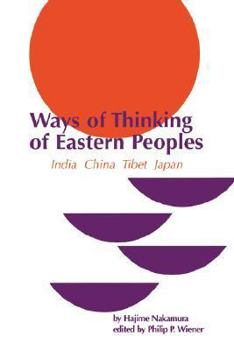Ways of Thinking of Eastern Peoples: India, China, Tibet, Japan (Revised English Translation)
Select Format
Select Condition 
Book Overview
First published in 1997. Routledge is an imprint of Taylor & Francis, an informa company.
Format:Paperback
Language:English
ISBN:0824800788
ISBN13:9780824800789
Release Date:May 1981
Publisher:University of Hawaii Press
Length:736 Pages
Weight:2.02 lbs.
Dimensions:1.8" x 6.1" x 9.0"
Customer Reviews
1 rating
Still Among the Very Best!
Published by Thriftbooks.com User , 19 years ago
Professor Hajime NAKAMURA (1912-99) of Tokyo University, one of the leading and most productive scholars of Buddhism in post-war Japan, in 1947 completed the first draft of this study, an English translation of which was which was printed under UNESCO auspices in 1960. It was subsequently revised and expanded as a result of Nakamura's interaction with a number of prominent Western scholars such as Yale's Arthur F. Wright (Buddhism in Chinese History, 1959), and Hawaii's Philip O. Wiener, who edited the revised English translation published by the University of Hawaii Press in 1964. In his preface to the 1960 edition Wright describes Nakamura's project: ". . . No people in the world today is isolated from those world-wide movements of thought and belief which are tending to transform the lives of all peoples. But each people accepts or rejects, adapts and modifies the universal ideologies which reach them. What governs this process, and what is it which produces within each culture an amalgam which is at once part of a world-wide movement and distinctively its own? Mr. Nakamura considers the spread of the universal religion of Buddhism; and in Chinese, Japanese, and Tibetan responses to Buddhism -- as well as in the history of Buddhism in India -- Mr. Nakamura finds clues to certain fundamental and persisting characteristics of their differing modes of thought. These characteristics in turn help to explain their fundamental historical and cultural differences one from another and their variant responses to Western culture in our time." Ways of Thinking is subdivided into four major parts: INDIA, CHINA, TIBET, and JAPAN; and it may be helpful to point out that Professor Nakamura's wide range of interests and study qualified him to attempt such an ambitious project -- as indicated by the fact that early in his career he was awarded a special prize for his four volume history of early (Indian) Vedanta philosophy. Perhaps some sense of the issues and problems involved in Ways of Thinking can be gleaned from the table of contents for the section on Japan. It must be noted, however, that these not sound-bites to conjure up a social stereotype. Rather, they are serious topics which Professor Nakamura addresses at length with many examples and notes. And we are free to agree or disagree with his conclusions only after we have carefully read what he has to say. PART IV: JAPAN 34. The Acceptance of Phenomenalism The Phenomenal World As Absolute -- This-Worldliness -- The Acceptance of Man's Natural Dispositions -- Emphasis on the Love of Human Beings -- The Spirit of Tolerance -- Cultural Multiplicity (Consisting of Several Strata Still Preserved) and Weakness of the Spirit of Criticism 35. The Tendency to Emphasize a Limited Social Nexus Overstressing of Social Relations -- Social Relationships Take Precedence over the Individual -- Unconditional Belief in a Limited Social Nexus -- Observance of Family Morals -- Emphasis





